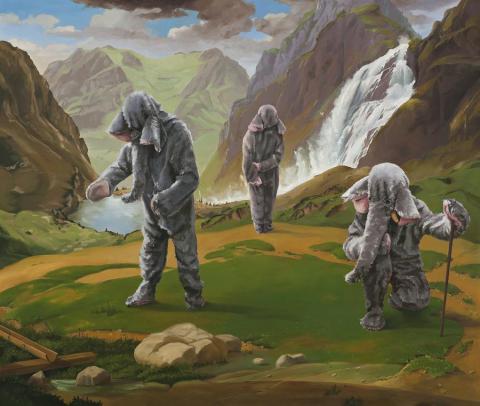JUST WAIT TILL NOW BECOMES THEN, 1996
STEPHEN BUSH
oil on canvas
198.0 x 239.0 cm
signed, dated and inscribed verso: JUST WAIT TILL NOW BECOMES THEN / Stephen Bush / 21/11/96
Robert Lindsay Gallery, Melbourne
Private collection, Melbourne
Blackwood Skyline, Stephen Bush: Work in Progress #5, The Ian Potter Museum of Art, The University of Melbourne, Melbourne, 2003, cat. 19
With his exuberant eclecticism and wit, Stephen Bush is internationally renowned as the author of sublime, cryptic works that seek to confound and provoke through their incongruous juxtaposition of elements and tantalisingly playful repetition of motifs. Transforming the very act of painting into performative representations, his art offers compelling meditation upon creativity and the role of the artist; notions of the original and the copy (high and low culture, authenticity and value); and upon both the materiality the conceptual parameters of his metier. As Kelly Gellatly elucidates, 'At the heart of Stephen Bush's art is the constant, almost nagging question of what it means to be an artist and particularly, what it means to work in the most anachronistic of mediums - paint.'1
The elephant as a subject first appeared in Bush's oeuvre in 1992 with 'The Lure of Paris' series featuring numerous, monochromatic depictions of Jean de Brunoff's portly Babar the Elephant traversing a rugged, Turneresque landscape. According to the original French children's story, Babar travels to Paris from Africa where he is 'civilised' by Western society - adopting Western cultural dress, customs, and behaviours- before then returning to the jungle to 'civilise' his fellow elephants. Revisiting the subject almost thirty times since, Bush's interpretations thus explore Australia's postcolonial identity, 'from the 1960s when many Australians felt the pull to Europe's sophistication and culture, though to the 90s and beyond, when the impact of white settlement on Aborigines started to spark regret and confusion.2
In Just Wait Till Then Becomes Now, 1996, connotations of loss and displacement are continued, with people here dressed in ill-fitting elephant suits plodding around absurdly in a lush green alpine setting. Moreover, that the scene appears so awkward - just a little too stilted, too sublime to be sincere - alludes to the way in which the artist perceives the history of Western art and culture has been manipulated and contrived, as Bush asserts: 'chaps standing in front of the diorama of an alpine scene - all linked together but looking very rigid and artificial - this is how I see the history of art!'3 Derived from the lyrics of the song 'Wasting Time' 1993 by The Judy Bats (an alternative Tennessee rock band active during the late 80s and early 90s), the title of the present work attests not only to Bush's interest in sophisticated quotation from a myriad of diverse sources including music, literature, film, art history, mass media, botany and horticulture. More significantly perhaps, it reveals the artist's deeper conceptual concerns. Like the almost identical composition When I Was Here, I Wanted to Be There, 1994, the work on offer poignantly reminds us of the impossibility of living in the present moment.
Indeed, for all their playful theatricality, Bush's compositions - inevitably similar but always slightly different - encourage the viewer in a postmodern world deluged with simulated images 'to push the meaning, to force a response'. As New York based art critic Jonathan Goodman elucidates, Bush 'is deeply serious about the role of art as witness', which is why he keeps returning time and again to his elephant painting, to ensure 'I don't forget where that passion, all those years ago, began.'4
1. Gellatly, K., 'Stephen Bush: Steenhuffel', Stephen Bush: Steenhuffel, exhibition catalogue, Ian Potter Museum of Art, 2014, p. 20
2. Bush quoted in Bellamy, L. 'The long call of a little elephant', The Age, 31 July 2004
3. Bush quoted in Barbour, J. (ed.), 'Interview with Stephen Bush by Peter Cripps', 1987
4. Goodman and Bush quoted in Bellamy, ibid.
VERONICA ANGELATOS
